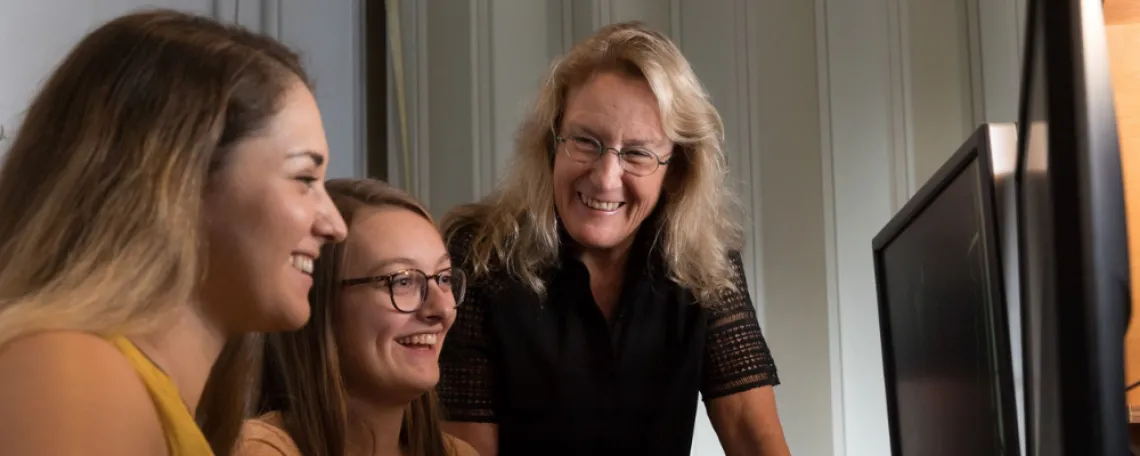Brain Research for the Ages
Studying aging takes a village and benefits the world

Carol Barnes is a Regents’ Professor in psychology, neurology and neuroscience at the University of Arizona College of Science. She also is the Evelyn F. McKnight Chair for Learning and Memory in Aging and the director of the Evelyn F. McKnight Brain Institute.
When Barnes became interested in brain aging, the picture was bleak, literally and figuratively. Standing in a library in 1972, she turned the page of one of the few available books on brain aging to diagrams of brain cells and saw what looked like progressive deterioration at different ages in humans. The message was clear: As we get older, our brain cells die, and those that remain atrophy, losing functionality.
This was before the founding of the National Institute on Aging, at a time when no journals on aging existed and little research was devoted to the topic. Barnes was devastated but also skeptical, and her continued curiosity led her to earn a doctorate in psychology in 1977. During her studies, she examined the neurobiological mechanisms of normal memory decline with age, which launched her decades-long career studying aging in the absence of neurodegenerative disease.
By 2006, Barnes was a renowned researcher in psychology, neurology and neuroscience. At the urging of the Evelyn F. McKnight Brain Research Foundation, which strives to better understand and alleviate age-related cognitive decline and help people maintain brain health as they age, she spent her winter break that year writing a research proposal that established the Evelyn F. McKnight Brain Institute and catalyzed her research with an associated $5 million gift. Barnes and her team used the funding to further their research on dynamic changes in cellular circuits and the genetic markers that underlie memory change.
Barnes and her collaborators have been so successful in advancing knowledge on normative aging that the foundation offered a $5 million matching gift less than 10 years after the brain institute was established at UArizona. The gift created an endowment that not only supports the recruitment of renowned researchers and expands participants for research studies but also covers research needs like buying supplies for genetic testing and analyzing blood samples.
Thanks to the matching-gift support, the institute will be able to do even more groundbreaking work.
“The whole purpose of the Evelyn F. McKnight Brain Institute is to improve the quality of life for an individual, for however long we live. We want to find ways to maintain cognition for as long as you’re lucky enough to live,” Barnes says.
Regarding the benefits of philanthropic funding relative to grant funding, Barnes says, “The remarkable thing is the flexibility and swiftness with which you have to take your idea and then implement and experiment — and then turn around and report your exciting results to the field and maybe actually make a difference in older individuals’ lives.”
The matching gift also helped Barnes pilot an idea for multidisciplinary study of the brain. Over several years, she pulled together a large group of colleges, departments, institutes and centers at UArizona along with several research universities and institutes across the Unites States, forming the Precision Aging Network (PAN) to conduct a series of projects to study the aging brain. Barnes wrote a grant proposal to fund a five-year national study, and in September 2021 she was awarded $60 million from the National Institutes of Health and National Institute on Aging to launch PAN and begin research at four participating sites across the United States: UArizona, the University of Miami, Emory University and Johns Hopkins University.
Barnes and the PAN team are now recruiting participants aged 50-79 for an in-depth, face-to-face study on memory and attention, using a novel internet-based testing platform called MindCrowd that was initiated in 2013 by PAN members Matthew Huentelman, a researcher at the Translational Genomics Research Institute, and Lee Ryan, head of the UArizona Psychology Department and the associate director of the Evelyn F. McKnight Brain Institute.
The participant pool for PAN, via MindCrowd, is the largest and most representative sample in a study of its kind and the largest sample of participants aged 18-90 in the world. MindCrowd currently has over 317,000 participants.
The results of the PAN study will offer longitudinal data vital to understanding memory function over time. As Barnes explains, “We want to close the gap between cognitive healthspan and human lifespan.”
Barnes’ early curiosity has paid off. Thanks to her research, we have a much different picture of the aging brain than we did 50 years ago. We now know that people do not lose a dramatic number of brain cells over the course of aging, but rather lose some flexibility in individual neurons and some connectivity between them. The brain is capable of forging new connections in service of our neurological needs as we age.
As Barnes reported to Congress in 2014: “Alzheimer’s disease is not inevitable. You don’t have major cell loss as you age. The brain is continually adapting, and many genetic and lifestyle factors can alter your trajectory toward a positive cognitive outcome.”
Contrary to what was posited on the aging brain in the early ’70s, the research by Barnes demonstrates that most people can hope to experience aging without neurodegenerative diseases. And every day that research on brain aging is supported, new knowledge may open doors to prevention and treatment in the realm of brain pathology.
—Riley Beck

